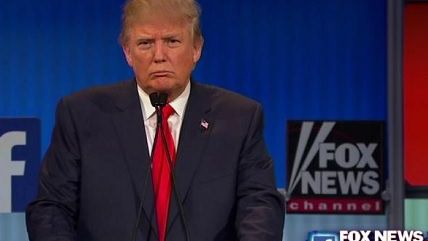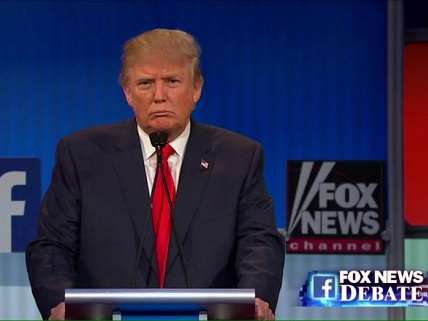No Donald Trump You're Not the Reason Illegal Immigration is an Issue in the Presidential Campaign
Trump's stance on illegal immigration, rather, is why he has traction


Donald Trump said something pretty remarkable, even for him, about illegal immigration at tonight's Republican presidential debate, claiming his focus on the issue was the reason it was being discussed on the campaign trail. "If it weren't for me, you wouldn't even be talking about illegal immigration," Trump told Chris Wallace, one of the co-hosts of the debate. "This was not a subject that was on anybody's mind until I brought it up at my announcement."
The polar opposite is the truth. "What I say is I say," Trump claimed, but on immigration what he says is what plenty of other Republicans have said too. In fact, one of the big reasons Trump has traction in the Republican race is because of his extreme position on immigration. The issue's animated the Republican base for several cycles. Republican voters took their time coming around to John McCain in 2008 in large part because of his "maverick" stance on immigration—he has supported "comprehensive reform," a catch-all term for efforts to create a path to normalize the status of illegal immigrants in the country, make it easier to work in and immigrate into the country, and militarize the border. The Republican candidates spent much of 2012 painting each other as soft on immigration, which may have come back to hurt eventual nominee Romney's chances in the general election.
President George W. Bush's campaign in 2006 for comprehensive immigration reform helped finally turn a lot of congressional Republicans away from him. Republicans, with help from Democrats, torpedoed Bush's efforts. Even Barack Obama, the eventual Democratic nominee and president, helped.
In his announcement, Trump claimed Mexico sent drug dealers, rapists, and other criminals across the border. While he blamed political reporters for misrepresenting his comments, it's not surprising so many people interpreted them as attacking the general population of Mexican, and Latino, immigrants. Over the following weeks, NBC News, Macy's, and several other companies cut their ties with Trump. But he kept rising in the polls because, as in previous elections, base Republican voters respond well to anti-immigration rhetoric. Trump isn't the reason his anti-immigration rhetoric, and economic xenophobia more generally, is well-received by some Americans. In an interview with Vox.com, socialist Bernie Sanders, running for the Democratic presidential nomination, called the idea of "open borders," or fewer immigration restrictions, a right-wing ploy to suppress wages. Sanders and populistus like him may not put it the same way as Trump, but they're as comfortable with rhetoric that suggests countries like China are "beating" the U.S. because of free trade as Trump is.
There are, of course, plenty of reasons more open immigration policies, up to open borders, are "good for America." But xenophobic economic populism and anti-immigration rhetoric are easier to play at the polls. Trump's taken advantage of the phenomenon, but he's certainly not the reason for it.
Editor's Note: As of February 29, 2024, commenting privileges on reason.com posts are limited to Reason Plus subscribers. Past commenters are grandfathered in for a temporary period. Subscribe here to preserve your ability to comment. Your Reason Plus subscription also gives you an ad-free version of reason.com, along with full access to the digital edition and archives of Reason magazine. We request that comments be civil and on-topic. We do not moderate or assume any responsibility for comments, which are owned by the readers who post them. Comments do not represent the views of reason.com or Reason Foundation. We reserve the right to delete any comment and ban commenters for any reason at any time. Comments may only be edited within 5 minutes of posting. Report abuses.
Please to post comments


I picked up on that as well. I thought it was typical of Trump's over-inflated ego and personal hype machine.
The bit that I haven't heard anyone else notice was his mumbling about being the power broker during the FOX set piece about supporting the nominee.
In discussing a 3rd party run, I could have sworn that I heard him start to say that the potential spoiler role that he could play as a 3rd party candidate makes him the power broker, meaning everyone would have to come to him. It was pretty revealing and nakedly money/power grubbing, if I understood him correctly.
"...I could have sworn that I heard him start to say that the potential spoiler role that he could play as a 3rd party candidate makes him the power broker, meaning everyone would have to come to him...."
Thanks for taking one for the team; no way I was going to watch or listen to that collection of gas-bags, and it wouldn't surprise me in the least if the donald weren't right now bragging to his latest blonde trophy about how everyone is going to have to court him.
I'm guessing (predicting) that 6 months down the road, folks will be saying 'remember when that asshole was in the debates?'
Here's the exchange:
Maybe I misunderstand what he's referring to here, but it sure sounded to me like he was saying that by holding on to a possible run as an independent he has a lot of leverage over the other candidates and party leaders (from both parties).
From Rand Paul's reaction it seems like he heard it the same way.
Here's the exchange:
Maybe I misunderstand what he's referring to here, but it sure sounded to me like he was saying that by holding on to a possible run as an independent he has a lot of leverage over the other candidates and party leaders (from both parties).
From Rand Paul's reaction it seems like he heard it the same way.
"...base Republican voters respond well to anti-immigration rhetoric...."
I wonder if "base" (D) voters don't also. inflating his poll numbers.
Regardless, xenophobia has always played well to "base" voters; it's a simplistic 'solution' to a problem which may or may not exist.
Why is it 'xenophobia' to be against millions of indigents swarming across our border and getting on the public do,e when we have no ability to put them all to work?
It is xenophobia to believe that these people are on the dole any more than natives and it's economic illiteracy to believe you can't put them to work. You only now how to double down on retard.
So what if I just admit I don't like people because of their country of origin.
Fuck the Venezuelans, they voted for Hugo Chavez. They voted to give up their rights, so fuck 'em. I don't want those idiots anywhere my ballot.
It is xenophobia to believe that these people are on the dole any more than natives...
I'm pro-immigration, but that's a bit of misnomer. They're on the dole less than natives, controlled for socio-economic status. But, given that the profile of the immigrant population includes a lot more poor people than the native population, you can't make that claim in absolute terms.
It's not xenophobic to understand mathematics beyond a soundbite.
"""It is xenophobia to believe that these people are on the dole any more than natives"""
Even if its equal percentages (say 10%) why should I be in favor of going from 10% of 300 million to 10% of 7 billion?
And of course the easiest way to make whatever case Reason wants to make re immigration policy is to demonize everyone who could possibly oppose it a xenophobic racist. Pretty much what both party establishments, all the big money donors, all the media have been doing for a decade.
I'm loving that alt text.
Had no idea Trump is that inarticulate and meandering in his speech. He's worse than Bush and Obama (another horrible speaker when he's not reading aloud). What is the average IQ of the political class, I wonder? My guess is it's around 80.
Trump is reminiscent of Jesse Ventura: A gasbag that is bored, doesn't really want the office, and if he won, would quit after the first term.
Great news, what this country needs is a do nothing President. Just think of how many fewer wars we will be involved in, how we would stop the ever increasing takeover of the economy, etc etc
We need another Clinton. Spent his time being a chubby chaser. I can support a Prez doing that. The worst possible scenario is a principled activist President.
Word for the day: "Cuckatarian".
lol, Trump is so full of himself.
http://www.Goin-Anon.tk
Can you say "Gorman Seedling"?
So Trump isn't the reason we are discussing immigration, just what Trump says about immigration? I think they call that a distinction without a difference.
Trump has so changed the debate on immigration, so made it clear how the public feels, that the other candidates were careful not to disagree with him. He's a huckster, but at least he's done that for the country.
You're supposed to hate Trump here, Sven. No props for nothing.